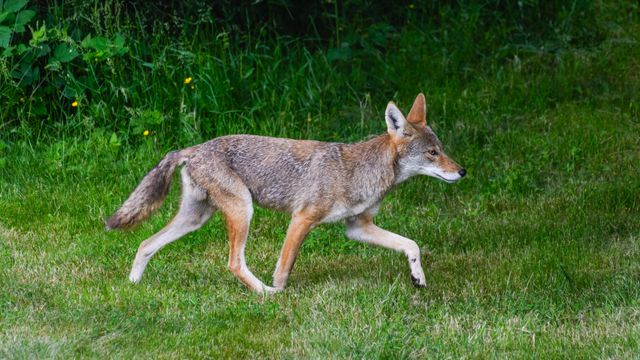Be careful: Howling coyotes this Halloween means pups are on the move
The North Carolina Wildlife Resources Commission says there will be more frequent sightings of coyotes over the coming weeks as young coyotes leave their parents' territory to establish a home of their own.
Posted — UpdatedIf the sound of a coyote howl is on your perfect Halloween sounds playlist, you may be in luck.
There will be more frequent sightings of coyotes over the coming weeks as young coyotes leave their parents’ territory to establish a home of their own.
"They may wander long distances, upward of 300 miles, before settling down somewhere that’s not already occupied by an established coyote pair," said The North Carolina Wildlife Resources Commission in a press release.
The agency said young coyotes will yip, howl and bark to keep track of each other, as well as other coyotes whose territories they are passing through. The hollow tone of their howl and a tendency to vocalize rapidly in a constant stream of sounds can "make two coyotes sound like 20."
Protect your pets and property
“These days coyotes are common across North Carolina, even in residential areas, though they can be very good at not being seen. Hearing or seeing one is no cause for surprise or alarm,” said Falyn Owens, the agency’s extension biologist. “Coyotes usually try to avoid people as much as possible.”
Owens warns, however, that coyotes are opportunists, and their typical standoffish behavior toward people can turn indifferent if they regularly get food near where people live and work, especially if they experience few consequences for hanging around.
- Supervise small pets when they're outside, especially around dawn and dusk. Don't let them wander free.
- Keep cats indoors and poultry in a predator-proof pen.
- Feed pets indoors or remove all food when a pet is finished eating outside.
- Store food waste in secure containers with tight-fitting lids.
- Keep birdseed off the ground around feeders or choose to attract birds with native plants.
- Intimidate coyotes to scare them off - make loud noises, throw small objects, spray them with a hose
"They’re territorial animals, so they understand when they’re overstepping their bounds into an area that doesn’t belong to them. Actively scaring off coyotes helps show them where they’re not welcome," says Owens.
The agency says the most common calls about coyotes coming in to their N.C. Wildlife Helpline are:
- Presence in the general area.
- Fear that coyotes pose a threat to people, pets or livestock, although no aggressive behavior or damage is reported.
- Observations of coyotes during the day, which is normal behavior and does not indicate disease.
- Loss or injury of outdoor or feral cats.
- Noise-related complaints.
• Credits
Copyright 2024 by Capitol Broadcasting Company. All rights reserved. This material may not be published, broadcast, rewritten or redistributed.






